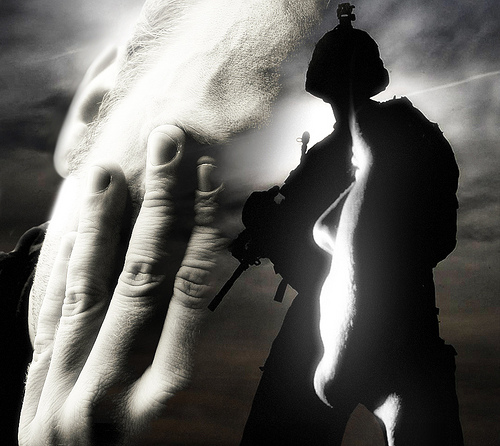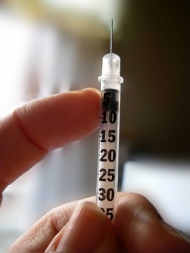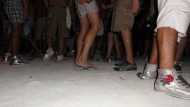Tags
Alcohol, PTSD

(Photo : Flickr/Truthout.org) Heavy drinking rewires the brain, making it difficult to overcome fears.
Post-Traumatic Stress Disorder (PTSD), often associated with experienced war-veterans (it is even known as shell-shock or combat stress) and sometimes victims of abuse, is an anxiety disorder that leaves many of those inflicted with feelings of paranoia, insomnia, loss of interest, anger or irritability and even suicidal tendencies.
The most common coping method for PTSD sufferers is alcohol and drugs.
A report released on June 8, 2012 revealed that suicides are surging among American troops, averaging to one a day this year,
Like Us on Facebook
"the fastest pace in the nation's decade of war," Robert Burns, AP National Security Writer reports.
Studies referenced in the report suggest that increased prescription alcohol abuse may be contributing to the rise in suicides, along with a spike in misbehavior, domestic violence and sexual assaults.
While experts have made previous connections between alcohol and such nervously erratic behavior (as mentioned above), they have now found that alcohol consumption actually rewires brain activity, making it especially hard for alcoholics to recover emotionally and psychologically from traumatic experiences.
A study conducted by scientists at the National Institute on Alcohol Abuse and Alcoholism (NIAAA) and UNC's Bowles Center for Alcohol Studies suggests chronic exposure to alcohol can cause a deficit with regard to how our cognitive brain centers control our emotional brain centers.
"A history of heavy alcohol abuse could impair a critical mechanism for recovering from a trauma, and in doing so put people at greater risk for PTSD," said NIAAA scientist Andrew Holmes, PhD, the study's senior author.
"The next step will be to test whether our preclinical findings translate to patients currently suffering from comorbid PTSD and alcohol abuse. If it does, then this could lead to new thinking about how we can better treat these serious medical conditions," He adds.
According to a report released by the University of North Carolina Health Care Center, the researchers gave one group of mice doses of alcohol equivalent to double the legal driving limit in humans while a second group of mice was given no alcohol. Over the course of a month, researchers trained all the mice to fear the sound of a brief tone.
When the tone was repeatedly played without stress-inducing incentives, the mice with no alcohol exposure gradually stopped fearing it. The mice with chronic alcohol exposure, on the other hand, froze in place each time the tone was played, even long after the electric shocks had stopped.
The pattern is similar to what is seen in patients with PTSD, who have trouble overcoming fear even when they are no longer in a dangerous situation. Upon neurological analysis, scientists found that heavy alcohol use suppresses a key receptor, NMDA, which is used-in layman's terms-to get over things.
Holmes said the findings are valuable because they pinpoint exactly where alcohol causes damage that leads to problems overcoming fear.
"We're not only seeing that alcohol has detrimental effects on a clinically important emotional process, but we're able to offer some insight into how alcohol might do so by disrupting the functioning of some very specific brain circuits," said Holmes.
In a June 12 study, Holmes and his team found that not only can fear be duped by will-power, but 'doped' by altering brain activity. By lowering enzyme levels for people who are naturally anxious and fearful, the drug calm people who may be naturally nervous.
However, Alcohol use exacerbates these symptoms to the point where the drug can have physically and psychologically detrimental effects.
The study is published online on Sept. 2, 2012 by the journal Nature Neuroscience.
-

Lose weight now! Give us just 24 days, and both you and your doctor will be amazed.
-

Free weight loss supplement with every sign up! Lose weight quickly and effectively guaranteed.
-

You can save a life. Help save a child from a lifetime of desperate poverty and despair.
-

-

-

Health -

Health
Growing Number of Older Woman Struggling with Eating Disorders -

Health
-

Health
Higher Level of Testosterone Makes Women Choose Self-Pleasure Over a Partner: Study -

Health -

Health
Anti-Smoking Ads Are Helping People Quit Smoking: CDC Reports
-

Psychology
Argumentative Teenagers More Likely to Resist Alcohol, Drugs: Study -

Health -

Health
Breast Milk Can Protect Children against the AIDS Virus: Study



